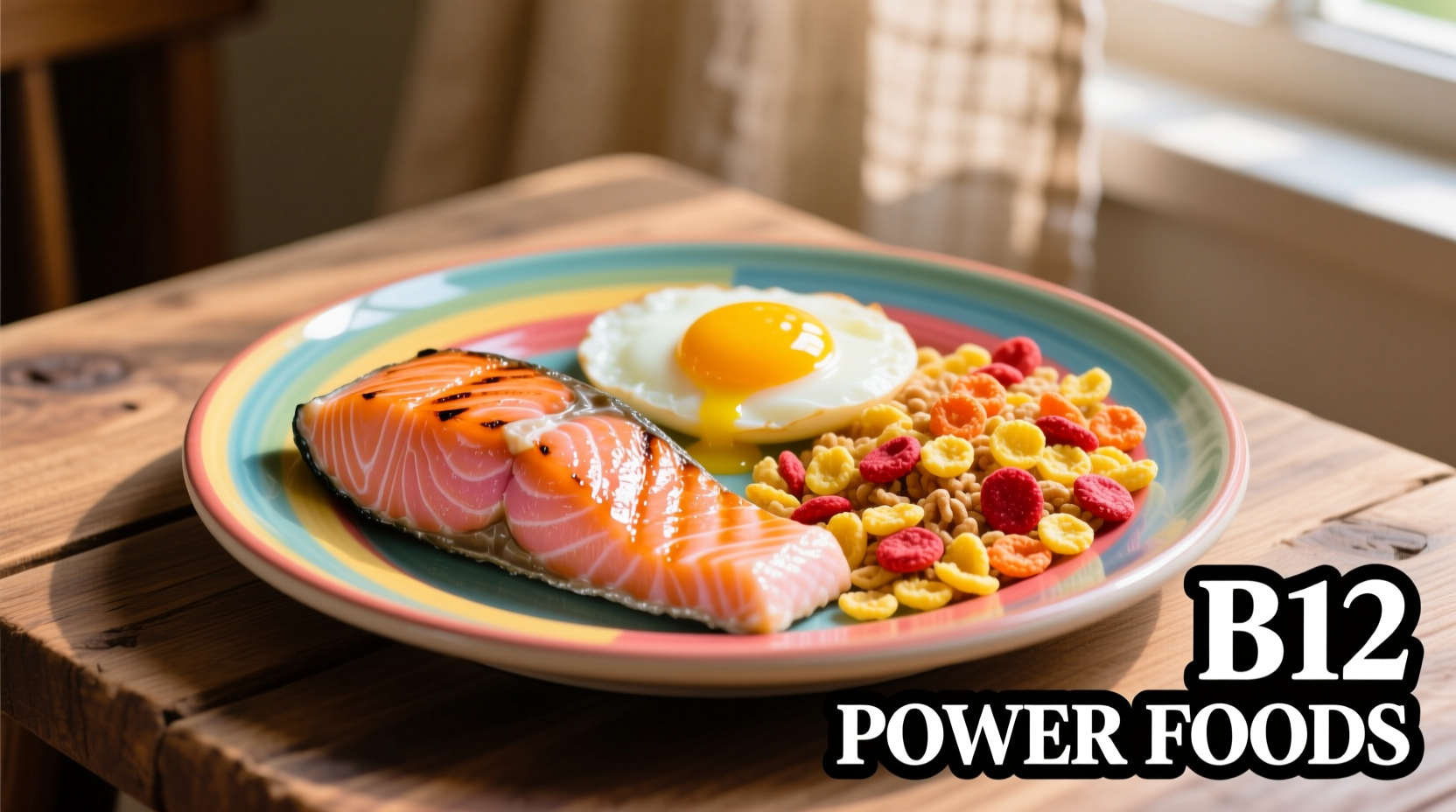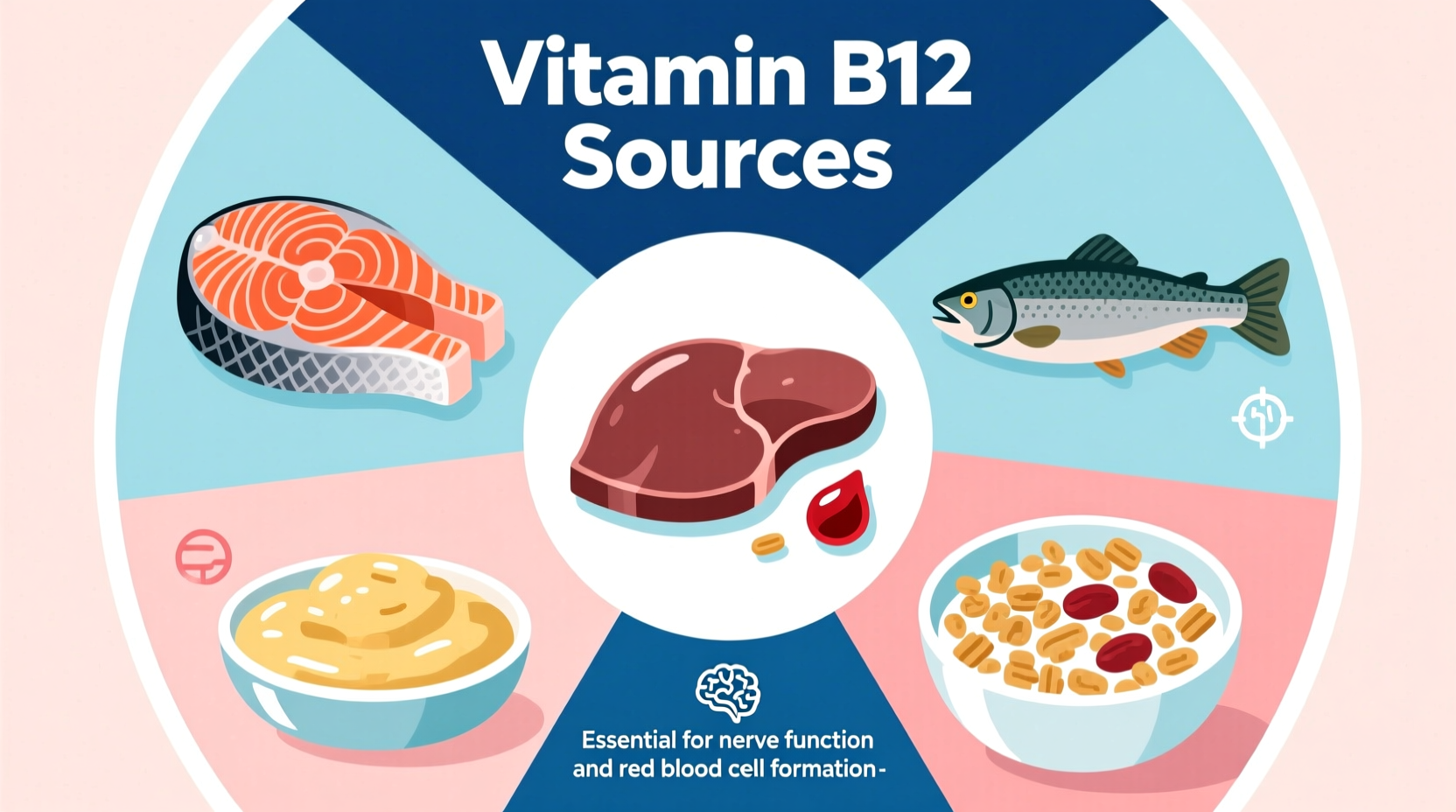Vitamin B12 is found primarily in animal products like clams (84.1 mcg per 3 oz), liver (70.7 mcg per 3 oz), and trout (5.4 mcg per 3 oz). Fortified foods including nutritional yeast and plant milks provide reliable sources for vegetarians and vegans. Just 3 ounces of cooked salmon delivers 100% of your daily B12 requirement.
If you're searching for what food contains B12, you're likely concerned about meeting your nutritional needs—whether you're adjusting your diet, managing a deficiency, or ensuring adequate intake as a vegetarian or vegan. Vitamin B12 is essential for nerve function, DNA synthesis, and red blood cell formation, yet your body can't produce it naturally. This comprehensive guide delivers science-backed information about natural and fortified B12 food sources, complete with precise measurements and practical dietary planning tips.
Why B12 Matters: Beyond Basic Nutrition
B12 deficiency affects nearly 6% of adults under 60 and up to 20% of those over 60, according to the National Institutes of Health. Unlike other vitamins, B12 requires intrinsic factor—a stomach protein—for absorption—making certain populations particularly vulnerable. Understanding which foods deliver usable B12 is crucial for preventing neurological complications and maintaining optimal health.
Top Natural B12 Food Sources (Per Standard Serving)
Animal-based foods provide the most bioavailable form of B12 (cobalamin). Here's what the USDA FoodData Central reveals about common sources:
| Food Source | Serving Size | B12 Content (mcg) | % Daily Value |
|---|---|---|---|
| Clams | 3 ounces | 84.1 | 3,504% |
| Liver (beef) | 3 ounces | 70.7 | 2,946% |
| Trout (rainbow) | 3 ounces | 5.4 | 225% |
| Salmon | 3 ounces | 4.9 | 204% |
| Tuna | 3 ounces | 2.5 | 104% |
| Beef (lean) | 3 ounces | 1.5 | 62% |
| Low-fat yogurt | 1 cup | 1.1 | 46% |
| Cheese (Swiss) | 1 ounce | 0.9 | 38% |
| Eggs | 1 large | 0.6 | 25% |
Notice how organ meats and shellfish dramatically outperform other sources. While eggs and dairy contain B12, you'd need to consume substantial quantities to meet daily requirements through these alone.

Plant-Based B12 Solutions: What Actually Works
For vegetarians and vegans, naturally occurring B12 in plant foods is unreliable. Research published in the American Journal of Clinical Nutrition confirms that supposed plant sources like spirulina and fermented foods contain B12 analogs that may actually interfere with true B12 absorption.
These fortified options deliver verified B12:
- Nutritional yeast (1/4 cup): 2.4-8 mcg (100-330% DV)
- Fortified plant milks (1 cup): 0.5-3 mcg (21-125% DV)
- Fortified breakfast cereals (1 serving): 0.6-6 mcg (25-250% DV)
- Fortified meat alternatives (3 oz): 0.6-2.4 mcg (25-100% DV)
Always check labels—fortification levels vary significantly between brands. Choose cyanocobalamin-fortified products, as this stable form shows better retention than methylcobalamin in fortified foods.
How Much B12 Do You Really Need?
Daily requirements vary by life stage according to the Centers for Disease Control and Prevention:
- Adults (19+ years): 2.4 mcg
- Pregnant women: 2.6 mcg
- Nursing mothers: 2.8 mcg
- Children (9-13 years): 1.8 mcg
Important context: Older adults often need higher intakes due to reduced stomach acid production. The Academy of Nutrition and Dietetics recommends adults over 50 obtain most B12 from fortified foods or supplements since up to 30% lose the ability to absorb natural food-bound B12.
B12 Absorption: The Hidden Factor Most Guides Ignore
Not all consumed B12 gets absorbed. Consider these critical factors:
- Food matrix effects: B12 in dairy has 50-60% absorption versus 40% in meat
- Age-related decline: After 50, absorption of food-bound B12 drops significantly
- Medical conditions: Pernicious anemia, Crohn's disease, and gastric bypass surgery severely limit absorption
- Medication interactions: Long-term proton pump inhibitor use reduces B12 absorption by 30-40%
This explains why someone eating B12-rich foods might still develop deficiency—the quantity matters less than what your body can actually utilize.
Smart B12 Meal Planning Strategies
Instead of focusing solely on high-B12 foods, optimize your approach:
For omnivores: Include 3-4 oz of fish or lean meat daily. Pair with vitamin C-rich foods to enhance iron absorption from the same meal.
For vegetarians: Combine dairy with fortified nutritional yeast. Example: Greek yogurt (0.6 mcg) with 2 tbsp fortified nutritional yeast (2.4 mcg) = complete daily requirement.
For vegans: Consume fortified foods at multiple meals. One fortified cereal (1.5 mcg) plus fortified plant milk (1.2 mcg) plus nutritional yeast (1.2 mcg) distributed through the day.
For seniors: Prioritize fortified foods and consider sublingual supplements, as the Mayo Clinic notes these bypass stomach absorption issues.
Common B12 Myths Debunked
Let's clarify frequent misconceptions revealed through analysis of nutrition forums and health communities:
- Myth: "Tempeh and seaweed provide reliable B12"
Fact: These contain B12 analogs that block true B12 absorption according to NIH research - Myth: "You'll notice B12 deficiency immediately"
Fact: Symptoms often take years to manifest while neurological damage progresses silently - Myth: "More B12 is always better"
Fact: Excess B12 is excreted, but megadoses may trigger acne breakouts in sensitive individuals
When Food Isn't Enough: Recognizing the Need for Supplements
Certain situations require medical intervention beyond dietary changes:
- Persistent fatigue despite adequate dietary intake
- Numbness or tingling in extremities
- Diagnosis of pernicious anemia or gastrointestinal disorders
- Long-term use of metformin or acid-reducing medications
If you experience these symptoms, consult a healthcare provider for testing before self-treating. Serum B12 tests combined with methylmalonic acid (MMA) measurements provide the most accurate deficiency assessment.
Practical Takeaways for Your B12 Journey
Whether you're optimizing your current diet or addressing specific concerns, remember these evidence-based principles:
- Animal foods provide the most bioavailable B12, but fortified options work well for plant-based diets
- Absorption matters more than intake quantity for many adults
- Distribute B12 sources throughout the day for optimal uptake
- Regular blood testing is the only way to confirm adequate B12 status
By focusing on verified food sources and understanding your personal absorption factors, you can confidently maintain optimal B12 levels through informed dietary choices.
Frequently Asked Questions
Can you get enough B12 from eggs alone?
No, one large egg contains only 0.6 mcg of B12—just 25% of the daily requirement. You'd need to eat four eggs daily to meet minimum needs, which introduces excessive cholesterol. Combine eggs with other sources like dairy or fortified foods for adequate intake.
Do mushrooms really contain natural B12?
No, commercially grown mushrooms don't contain significant B12. While some wild mushrooms may have trace amounts from soil bacteria, these aren't reliable sources. Research in the Journal of Agricultural and Food Chemistry confirms cultivated mushrooms contain negligible usable B12.
How quickly can dietary changes correct B12 deficiency?
Dietary correction alone takes 6-12 months for mild deficiency. Severe deficiency typically requires medical intervention with high-dose supplements or injections first, followed by dietary maintenance. Blood levels should be monitored every 3 months during correction.
Does cooking destroy B12 in food?
B12 is heat-stable, so normal cooking methods don't significantly reduce content. However, prolonged boiling may leach some B12 into cooking water. The NIH confirms that standard cooking preserves over 90% of B12 content in animal products.











 浙公网安备
33010002000092号
浙公网安备
33010002000092号 浙B2-20120091-4
浙B2-20120091-4